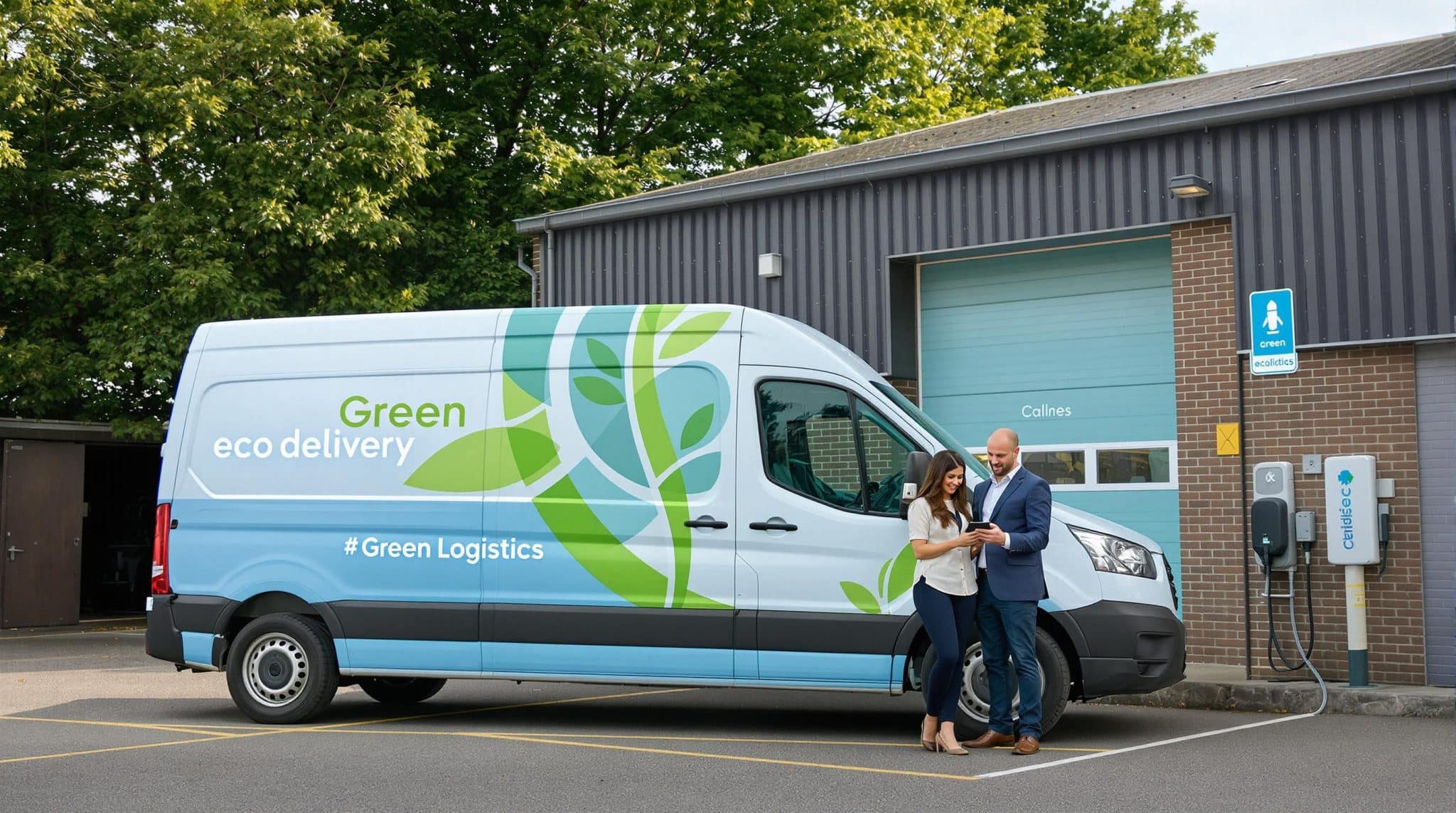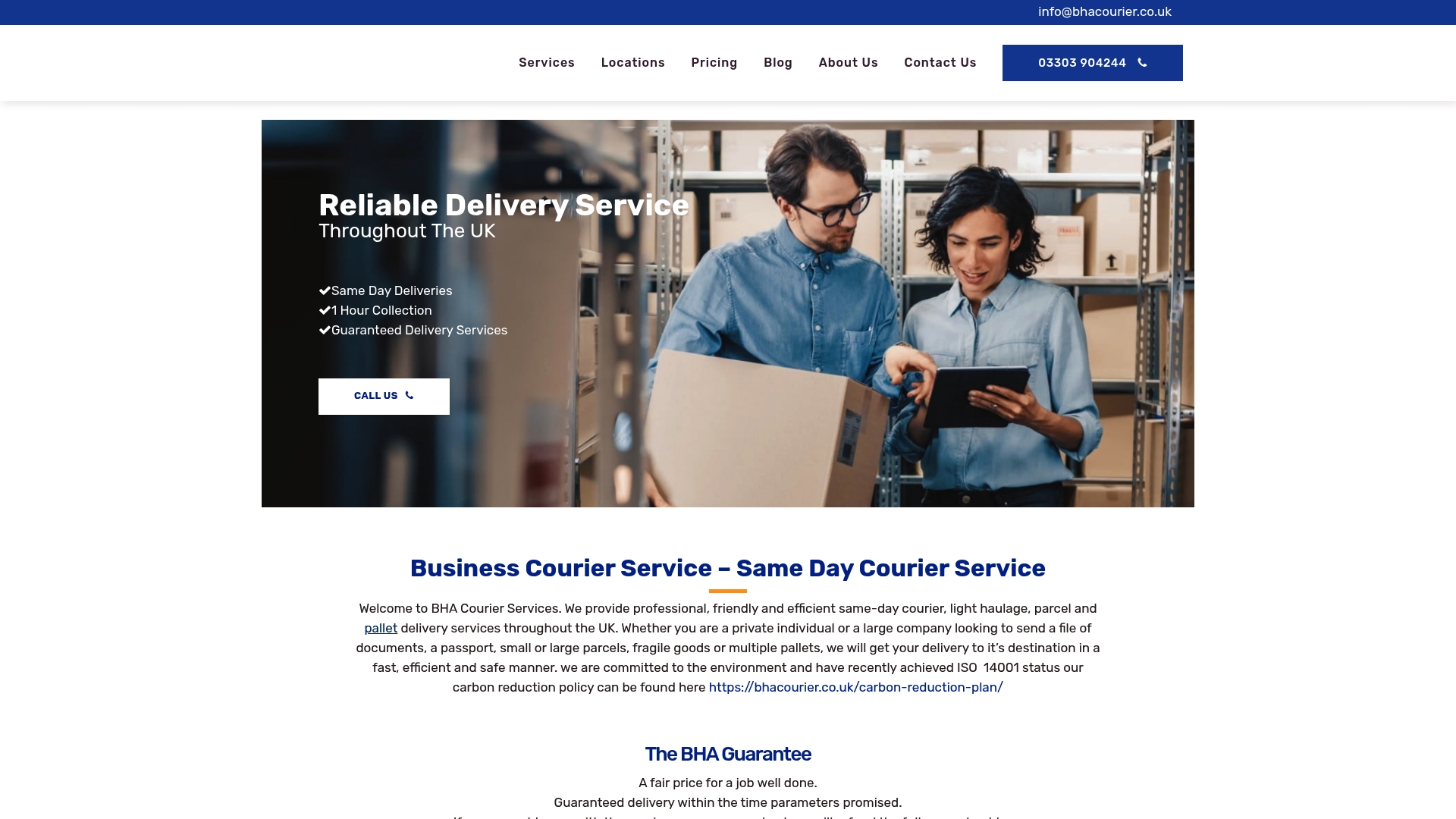
28 Jul Green Logistics Strategies for UK Businesses in 2025
Green logistics is quickly becoming the backbone of modern UK business strategy and not just for ticking a sustainability box. More than half of British consumers say they are more likely to choose a brand based on its environmental practices and one in three SMEs have already adopted low-emission vehicles or eco-friendly packaging. Yet while many assume green initiatives are expensive distractions, the real surprise is how much money they actually save firms. For UK businesses in 2025, going green is proving to cut operational costs, attract new customers and make competitors play catch up.
Table of Contents
- Key Green Logistics Strategies For 2025
- Benefits For Small And Medium Businesses
- Practical Steps To Adopt In The UK
- Overcoming Challenges In Eco-Friendly Transport
Quick Summary
| Takeaway | Explanation |
|---|---|
| Invest in electric vehicle fleets | Transitioning to electric vehicles significantly reduces carbon emissions and operational costs for logistics. |
| Utilise advanced route optimization | Implementing AI-driven routing can lower fuel consumption and overall emissions through efficient delivery paths. |
| Adopt sustainable packaging practices | Employing recyclable and biodegradable materials reduces waste and enhances brand reputation among consumers. |
| Conduct carbon footprint assessments | Assessing current emissions is crucial for identifying areas of improvement and strategizing sustainability initiatives. |
| Collaborate with green suppliers | Forming partnerships with environmentally responsible suppliers can enhance your supply chain’s sustainability and performance. |

Key Green Logistics Strategies for 2025
As businesses across the United Kingdom prepare for a more sustainable future, green logistics strategies have become critical for reducing environmental impact and maintaining competitive advantage. The transportation and logistics sector plays a significant role in carbon emissions, making innovative approaches essential for sustainable business operations.
Electrification of Transport Fleets
Transitioning to electric vehicles represents a fundamental green logistics strategy for UK businesses in 2025. The UK government’s Greening Government Commitments emphasize the importance of reducing greenhouse gas emissions through clean technology adoption. Electric delivery vehicles offer substantial environmental benefits, including:
- Reduced Carbon Emissions: Electric vehicles produce zero direct emissions, significantly lowering a company’s carbon footprint.
- Lower Operating Costs: Reduced fuel expenses and lower maintenance requirements make electric fleets financially attractive.
- Regulatory Compliance: Aligning with national sustainability targets and upcoming environmental regulations.
Companies are increasingly investing in electric vans and trucks, recognizing the long-term environmental and economic advantages of electrification.
Advanced Route Optimization Technologies
Smart route optimization technologies provide another critical green logistics strategy for minimising environmental impact. By leveraging artificial intelligence and real-time data analytics, businesses can:
- Reduce unnecessary mileage
- Minimize fuel consumption
- Decrease overall carbon emissions
The Environment Agency’s business plan for 2025 to 2026 highlights the importance of integrating clean technologies into business operations. Advanced routing algorithms can help logistics companies achieve significant environmental efficiencies by calculating the most economical and environmentally friendly delivery paths.
Sustainable Packaging and Circular Economy Approaches
Green logistics extends beyond transportation, encompassing comprehensive sustainable practices. Businesses are increasingly adopting circular economy principles by:
- Implementing recyclable and biodegradable packaging materials
- Designing packaging for multiple-use scenarios
- Creating closed-loop supply chain systems that minimise waste

These strategies not only reduce environmental impact but also demonstrate corporate responsibility and appeal to environmentally conscious consumers. By embracing green logistics strategies, UK businesses can contribute to national sustainability goals while maintaining operational excellence and competitive advantage in an increasingly eco-aware marketplace.
The transition to green logistics requires a holistic approach, combining technological innovation, strategic planning, and a genuine commitment to environmental stewardship. As we move towards 2025, businesses that proactively adopt these strategies will be best positioned to thrive in a sustainable future.
To clarify and compare the main green logistics strategies discussed, the table below summarises their benefits and primary focus:
| Strategy | Main Benefits | Primary Focus |
|---|---|---|
| Electrification of Transport Fleets | Reduced emissions, lower operating costs, regulatory compliance | Vehicle/Transport |
| Advanced Route Optimization Technologies | Lower fuel use, reduced emissions, improved efficiency | Delivery/Routing |
| Sustainable Packaging & Circular Economy | Less waste, improved brand image, resource efficiency | Packaging/Supply Chain |
Benefits for Small and Medium Businesses
Small and medium enterprises (SMEs) in the UK stand to gain significant advantages by implementing green logistics strategies. These approaches not only contribute to environmental sustainability but also offer substantial economic and competitive benefits that can transform business operations.
Cost Reduction and Financial Efficiency
Contrary to common misconceptions, green logistics can be a powerful mechanism for reducing operational expenses. Research from arXiv on European SMEs indicates that businesses investing in environmental skills and personnel can dramatically improve resource efficiency. By adopting strategies such as optimized routing, electric vehicle fleets, and sustainable packaging, SMEs can experience substantial cost savings:
- Fuel Expense Minimisation: Electric and efficiently routed vehicles significantly reduce fuel consumption
- Lower Maintenance Costs: Modern green technologies often require less frequent maintenance
- Energy Efficiency: Implementing sustainable practices leads to reduced overall energy expenditure
These financial benefits make green logistics not just an environmental choice, but a smart economic strategy for SMEs looking to improve their bottom line.
Enhanced Brand Reputation and Customer Attraction
Modern consumers are increasingly environmentally conscious, preferring businesses that demonstrate genuine commitment to sustainability. Green logistics strategies provide SMEs with a powerful marketing advantage. By visibly reducing carbon footprint and adopting eco-friendly practices, businesses can:
- Attract environmentally aware customers
- Differentiate themselves from competitors
- Build stronger, more positive brand perceptions
Government research on sustainable business practices highlights how transparency in environmental efforts can significantly enhance corporate reputation and customer loyalty.
Regulatory Compliance and Future-Proofing
As environmental regulations become increasingly stringent, SMEs adopting green logistics strategies position themselves ahead of potential legislative requirements. Proactive businesses can:
- Anticipate and adapt to emerging environmental standards
- Reduce risks associated with potential future regulatory penalties
- Demonstrate corporate responsibility and ethical business practices
By integrating sustainable logistics approaches now, SMEs can create resilient business models that are well-prepared for future environmental and economic challenges. The investment in green technologies and practices today represents a strategic approach to long-term business sustainability and competitive advantage.
Green logistics is no longer just an optional strategy but a critical component of modern business success. For small and medium enterprises willing to innovate and adapt, these approaches offer a pathway to reduced costs, enhanced reputation, and a more sustainable future.
To highlight the key benefits for UK SMEs, the following table summarises the main advantages of green logistics implementation:
| Benefit Category | How Green Logistics Delivers Value |
|---|---|
| Cost Reduction | Lowers fuel/energy usage, reduces maintenance costs |
| Brand Reputation | Attracts eco-conscious customers, improves public perception |
| Regulatory Compliance | Prepares for future laws, reduces risk of penalties |
| Competitive Advantage | Differentiates business, appeals to new customer segments |
Practical Steps to Adopt in the UK
Implementing green logistics strategies requires a systematic and strategic approach for UK businesses. This section outlines practical, actionable steps that organisations can take to transition towards more sustainable logistics operations.
Conducting a Comprehensive Carbon Footprint Assessment
The first critical step in adopting green logistics is understanding the current environmental impact of business operations. The UK Department for Business, Energy and Industrial Strategy recommends comprehensive carbon footprint assessments as a foundational strategy. This process involves:
- Detailed Emissions Mapping: Identifying and quantifying greenhouse gas emissions across transportation, warehousing, and supply chain activities
- Performance Benchmarking: Comparing current emissions against industry standards and national sustainability targets
- Identifying Improvement Opportunities: Pinpointing specific areas where environmental efficiency can be enhanced
Businesses can leverage specialized carbon accounting tools and consultants to conduct thorough and accurate assessments, providing a clear roadmap for sustainable transformation.
Investing in Green Technologies and Infrastructure
Transitioning to green logistics requires strategic investments in sustainable technologies. UK businesses should consider:
- Electric and Hybrid Vehicle Fleets: Gradually replacing traditional combustion engine vehicles with electric or hybrid alternatives
- Advanced Telematics Systems: Implementing sophisticated tracking and routing technologies to optimize fuel efficiency
- Renewable Energy Integration: Utilizing solar panels or wind energy for warehouse and logistics centre operations
The Carbon Trust suggests that businesses can reduce their carbon emissions by up to 20% through targeted technological investments, making this approach both environmentally and economically beneficial.
Developing Sustainable Supply Chain Partnerships
Creating a green logistics ecosystem requires collaboration and strategic partnerships. Businesses can:
- Engage with suppliers committed to sustainable practices
- Develop shared environmental performance metrics
- Collaborate on innovative carbon reduction initiatives
- Implement circular economy principles in procurement strategies
By fostering a network of environmentally responsible partners, UK businesses can create a more holistic and impactful approach to sustainable logistics.
Successful green logistics adoption is not a single event but a continuous journey of improvement, innovation, and commitment. UK businesses that approach this transformation strategically will not only contribute to national environmental goals but also position themselves as forward-thinking, responsible organisations in an increasingly sustainability-focused marketplace.
Overcoming Challenges in Eco-Friendly Transport
Transitioning to eco-friendly transport presents significant challenges for UK businesses, requiring strategic approaches and innovative solutions to navigate complex environmental and operational obstacles.
Infrastructure and Technological Limitations
The shift towards sustainable transport faces substantial infrastructure barriers. Research from RAND Corporation highlights the complexities of developing comprehensive green logistics networks. Key challenges include:
- Charging Infrastructure: Limited electric vehicle charging points across UK transportation routes
- Battery Technology: Current limitations in battery range and charging speed for commercial vehicles
- High Initial Investment: Significant upfront costs for electric and alternative fuel vehicle fleets
Businesses must work collaboratively with government agencies and technology providers to address these infrastructure gaps, developing innovative solutions that make eco-friendly transport more accessible and practical.
Financial and Economic Constraints
Economic considerations represent a significant hurdle in adopting green transport strategies. Small and medium enterprises often struggle with the financial implications of transitioning to sustainable logistics. Strategies to mitigate these challenges include:
- Exploring government grants and financial incentives for green technology adoption
- Implementing phased transition plans to spread out investment costs
- Calculating long-term savings from reduced fuel and maintenance expenses
The UK Government’s Green Finance Strategy provides frameworks and support mechanisms to help businesses overcome financial barriers to sustainable transport solutions.
Regulatory Compliance and Skill Development
Navigating the complex landscape of environmental regulations and developing the necessary workforce skills presents another critical challenge. Businesses must:
- Invest in continuous staff training on green logistics technologies
- Stay updated with evolving environmental regulations
- Develop internal expertise in sustainable transport management
Successful implementation requires a holistic approach that combines technological innovation, financial planning, and workforce development. UK businesses must view eco-friendly transport not as a burden, but as an opportunity for competitive advantage and long-term sustainability.
The journey towards sustainable transport is complex but essential. By addressing infrastructure limitations, managing financial constraints, and investing in skills and knowledge, businesses can transform challenges into opportunities for innovation and environmental responsibility. The most successful organisations will be those that approach these challenges with creativity, strategic planning, and a genuine commitment to reducing their environmental impact.
Frequently Asked Questions
What are the main green logistics strategies for UK businesses in 2025?
The key green logistics strategies for UK businesses in 2025 include electrification of transport fleets, advanced route optimisation technologies, and sustainable packaging practices. These strategies help reduce carbon emissions and improve overall operational efficiency.
How can small and medium enterprises benefit from adopting green logistics?
SMEs can benefit from green logistics through cost reductions, enhanced brand reputation, and regulatory compliance. By implementing these sustainable practices, businesses can save on operational costs while attracting environmentally conscious customers.
What practical steps can UK businesses take to adopt green logistics?
UK businesses can start by conducting a comprehensive carbon footprint assessment, investing in green technologies such as electric vehicles, and developing sustainable supply chain partnerships. These steps create a clear direction towards sustainable logistics operations.
What challenges do businesses face when transitioning to eco-friendly transport?
Businesses often face challenges such as infrastructure limitations, financial constraints, and the need for regulatory compliance and workforce training. Addressing these challenges requires strategic planning and collaboration with stakeholders.
Ready to Make Green Logistics Your Competitive Edge?
Have rising delivery costs and sustainability pressures left you searching for a reliable logistics partner that truly understands the future of eco-friendly transport? This article highlighted a real pain point for many UK businesses: the need to reduce carbon emissions and boost efficiency, without sacrificing speed or security. But embracing green logistics is not just about going electric. It is about working with a supplier who values advanced route optimisation, resource efficiency and the principles of responsible delivery — every single day.

At BHA Courier, we combine our ISO 14001 certified commitment to environmental standards with rapid, secure courier solutions nationwide. Our same-day and next-day services are already helping UK businesses meet greener goals while staying ahead of competitors, all powered by real-time tracking and tailored customer care. Looking for a partner who can help you streamline your operations, save costs and protect your reputation? Take your first step towards a more sustainable and efficient future. Get a quote or discover more about our secure courier services today. Now is the right moment to join businesses across the UK creating smarter, cleaner supply chains.


